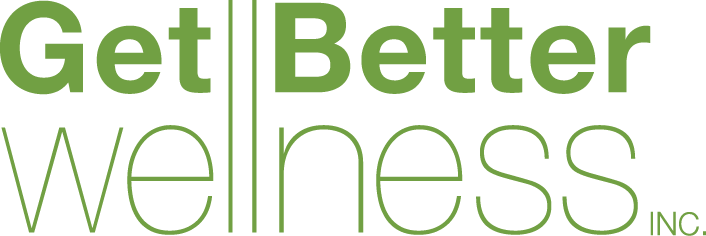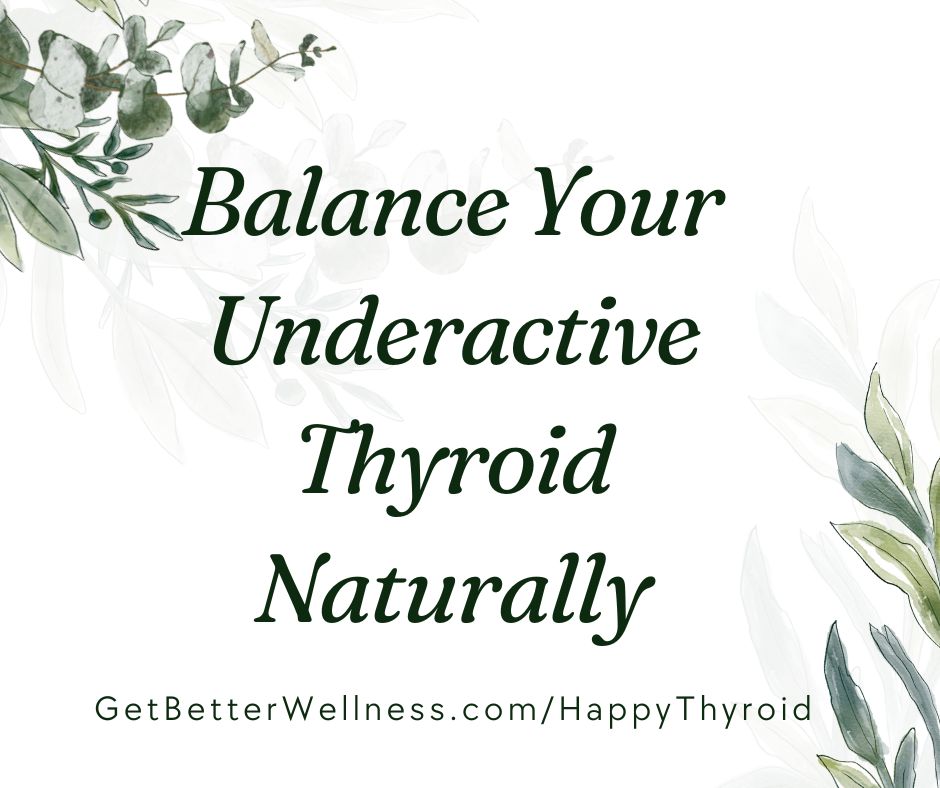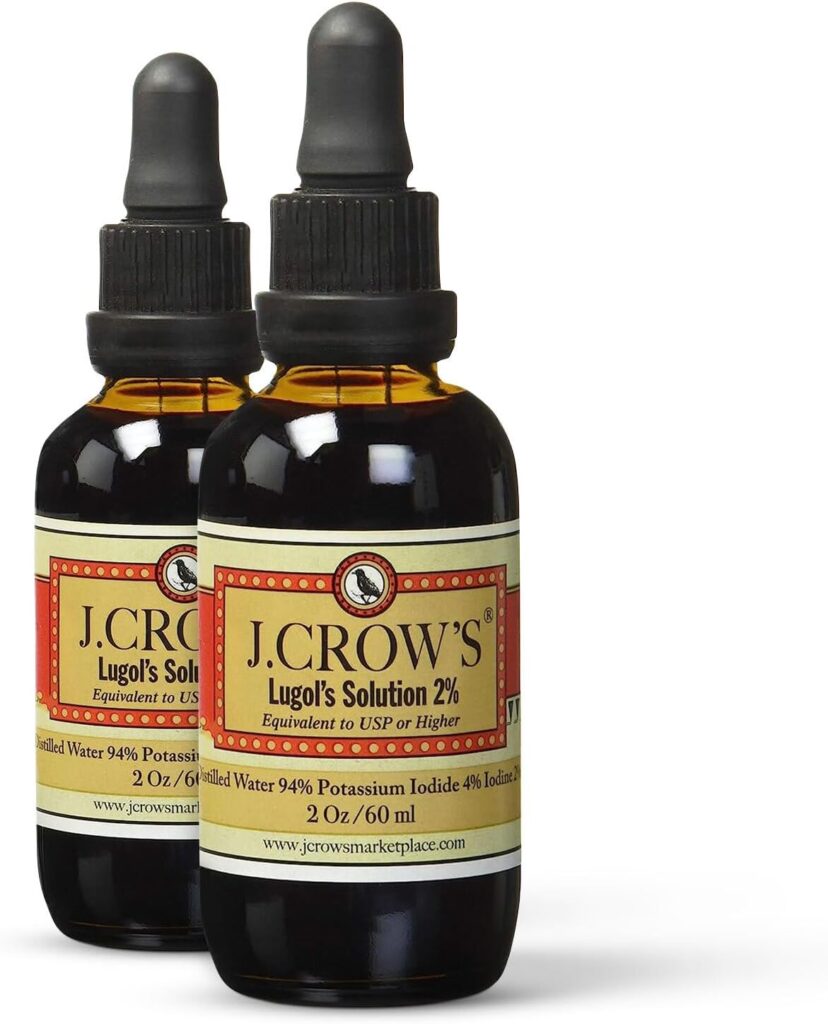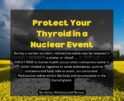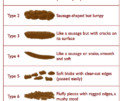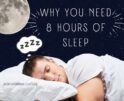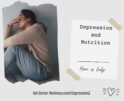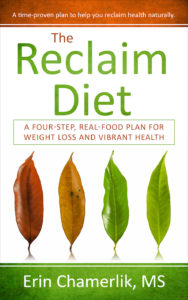
Balance Your Underactive Thyroid Naturally
Basic Thyroid Information
What is the thyroid? The thyroid is a butterfly-shaped gland located in the lower front of the neck. The thyroid makes thyroid hormone (including T4, T3), which is then used by every tissue in the body. Thyroid hormone is essential to help each cell in each tissue and organ to work right. For example, thyroid hormone helps the body use energy, stay warm, and keep the brain, heart, muscles, and other organs working as they should.
Thyroid hormones have 2 basic components.
- Tyrosine, an amino acid
- Iodine
T4 (thyroxine) is tyrosine with four iodine atoms. It is the inactive hormone.
T3 (triiodothyronine) is the active form with three iodine atoms. T4 is converted to T3 by the removal of one iodine atom. T3 can be used immediately by the cells.
Thyroid Stimulating Hormone (TSH) is made in the pituitary gland in the brain. It senses how well the thyroid is working and will tend to increase when the thyroid needs to produce more thyroid hormone.
Hypothyroidism
Hypothyroidism means too little thyroid hormone.
Also called underactive thyroid.
Hypothyroid symptoms according to NIDDK
Some common symptoms of hypothyroidism are:
- fatigue
- weight gain
- a puffy face
- cold intolerance
- joint and muscle pain
- constipation
- dry skin
- dry, thinning hair
- decreased sweating
- heavy or irregular menstrual periods and impaired fertility
- depression
- slowed heart rate
- thinning of the outer 1/3 of the eyebrows
T4 is the inactive form of thyroid hormone. T3 is the active form.
T4 has to be converted into the active form T3.
This conversation happens in the liver (80% of the time, and kidneys, 20%)
How healthy is your liver?
Get Your Thyroid Tested!
- Have your thyroid function properly evaluated with a COMPLETE Thyroid Panel (Free T3, Free, T4, TSH, thyroid antibodies, Reverse T3). Often doctors will only test the TSH, which is inadequate. If your doctor is unwilling to order the complete thyroid panel, then you can order your own lab testing from DirectLabs. Look for Thyroid Panel Complete + Thyroid Antibodies.
- You may need medication and if you do, I recommend desiccated thyroid medication along with following the recommendations below.
Diet
It is important to eat an anti-inflammatory, real food diet that is rich in quality animal protein and healthy fats. Some non-starchy vegetables, fruit, seeds and nuts may work.
Nutrients that support the thyroid gland
Selenium (Helps convert T4 to T3).
Selenium is essential in trace amounts. Avoid over consuming selenium because it is harmful in high amounts. Food sources of selenium: Organ meat, seafood (salmon, tuna, halibut, sardines, mackerel, grouper, snapper, herring, smelt, cod), scallops, lobster, shrimp, clams, oysters, pork, beef, turkey, chicken, lamb, eggs, dairy, butter, Brazil nuts (caution, they are very high in selenium, limit to 3 a day), Apple cider vinegar. Read more about selenium here.
Recommended intake of Selenium
- Recommended dose: 100 – 200 mcg/day
- My doctor wants me to supplement certain amounts of selenium, zinc, etc, so I take either LDA Trace Mineral Complex (1 capsule every other day gives me 100mcg average per day of selenium), or Multimineral Complex without iron (1 capsule daily provides 100mcg selenium).
- Both options above have other minerals in balance including zinc with copper and chromium.
Magnesium
Hypothyroidism can occur due to deficiencies in magnesium and other micronutrients. People with autoimmune Hashimotos thyroiditis typically have suboptimal magnesium levels and thyroid inflammation.
- Magnesium supplementation helps reduce inflammation and oxidative stress.
- Optimal magnesium levels can help address headaches, constipation and high blood pressure.
- Magnesium supplements improve mitochondrial function (cellular energy production).
- Supplementation of magnesium may have beneficial effects in patients with hypothyroidism and diseases associated with hyperthyroidism. In patients with hypothyroidism, a significant increase in serum free T4, a decrease in inflammation, shown by lower hs-CRP, were found after supplementation at 10 weeks. [source]
How to Determine Your Magnesium Dosage
The amount of magnesium an individual needs will vary. You will find your dose by slowly working up to bowel tolerance.
- Use a form of magnesium that is absorbable, and contains multiple forms like magnesium glycinate, citrate and ascorbate. I prefer Mg Plus Guard shown below.
- Most people need 400 – 600 mg daily. Start with one capsule at bedtime the first night.
- Then two capsules the second night.
- Three capsules the third night, and so on. Increase by one capsule each night.
- When you experience a loose stool the following morning reduce your nightly dose by one capsule and stay at that dose daily.
L-Tyrosine
Tyrosine is an amino acid that the body uses for the formation of T3 and T4 thyroid hormones. L-tyrosine is also an important precursor for brain-stimulating catecholamines (dopamine, norepinephrine, and epinephrine) which support stress response mechanisms and the ability to concentrate.
We need to consume adequate animal protein in the diet and we need to be able to break protein down and absorb it. Leaky gut and low stomach acid can get in the way of amino acid absorption. Consuming red meat, poultry and fish regularly will provide adequate amounts of tyrosine. Collagen powder, like Great Lakes, provides 96 mg tyrosine per serving.
Iodine
Do not fear iodine. Almost everyone needs to supplement with 2% J.Crow’s Lugol’s Iodine according to Dr. Brownstein. Here’s a video interview between Judy Cho and Dr. Brownstein and his book, Iodine: Why You Need It. Why You Can’t Live Without It. $20 on his website. Dr. Brownstein recommends starting with one drop of Lugols Solution 2% and slowly increasing the dose until you feel the difference. You may need 4 to 8 drops. Here’s a calculator to determine how many mg iodine is in a certain number of drops of 2% Lugol’s.
Zinc
Many people are deficient in zinc and it is very important for proper thyroid function. Zinc helps with the conversion of T4 to the active thyroid hormone, T3. Zinc is needed for a healthy immune system which will provide benefits for the inflamed thyroid. Zinc is anti-inflammatory. I recommend taking a multi mineral supplement that includes selenium and zinc.
Methylated B Vitamins with Extra B12
Methylated B vitamins support thyroid health and the detoxification process. One study found that 40% of hypothyroid participants were low in B12. B12 is important for cognitive function, red blood cells and the immune system. Read more here.
Vitamin D3 with K2
Vitamin D is necessary for the normal functioning of many organs, including the thyroid gland. It is not surprising that vitamin D deficiency is considered a risk factor for the development of many thyroid disorders, including autoimmune thyroid diseases and thyroid cancer. [source]
When supplementing with Vitamin D3, follow these guidelines and include K2.
Omega 3 Cod Liver Oil or ProOmega 2000
Consume fish for the most bioavailable forms of Omega 3 fatty acids and add an omega 3 supplement like Carlson Cod Liver Oil, 2-3 tsp/day or ProOmega 2000 gel caps.
Essential oils that support thyroid function
- Endoflex Blend (see below)
- Frankincense (try 1 drop morning and night topically over the thyroid)
- Lemongrass (try 1 drop over thyroid twice daily)
- Peppermint (beneficial for fighting fatigue and brain fog. Simply inhale or add a drop to water daily)
EndoFlex
For overall vitality, I recommend the essential oil blend, EndoFlex. This blend of essential oils is a fabulous support for the endocrine system. You will love using it for your thyroid and adrenal glands. Simply rub a few drops over thyroid and adrenal glands every morning.
To support your thyroid eat an anti-inflammatory diet.
Erin’s Happy Thyroid Tips class
Get Better Wellness is reader supported. This post may contain affiliate links, which means that I may receive a small commission when you buy from links on this site. This is at no cost to you.
Recommended
-
Potassium Iodide and Nuclear War or Nuclear AccidentApril 23rd, 2024
-
Natural Remedies for ConstipationApril 23rd, 2024
-
Magnesium Deficiency Triggers 22 ConditionsApril 22nd, 2024
-
Four reasons that you need about eight hours of sleepApril 21st, 2024
-
Depression and NutritionApril 20th, 2024
